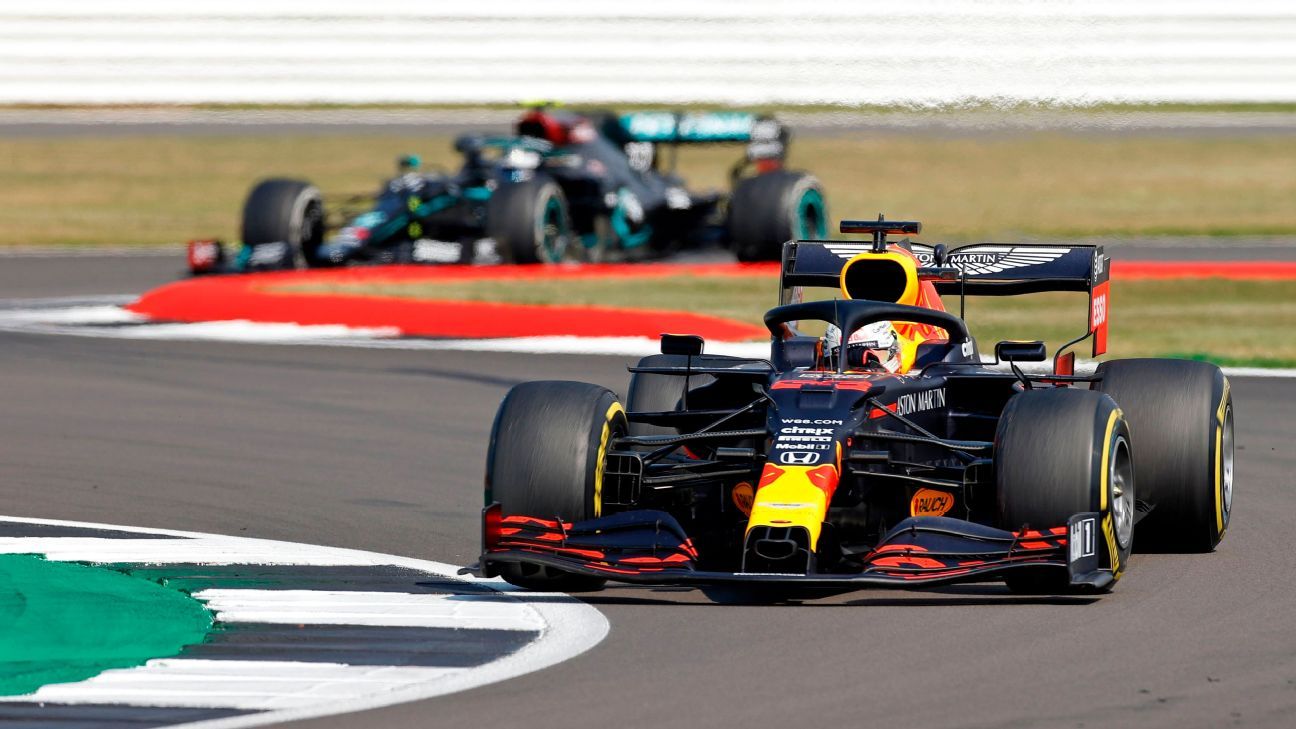The 70th Anniversary Grand Prix saw Max Verstappen end fears of Mercedes winning every race of the season in what felt like a classic two-stop contest of old.
Here’s a look at why the race unfolded the way it did.
How did Red Bull beat Mercedes?
The simple answer, of course, is that Max Verstappen was faster over the course of 52 laps than Lewis Hamilton and Valtteri Bottas. But in the context of a season that has been dominated by Mercedes, and on a circuit where Mercedes looked unbeatable (up until a last-lap tyre failure) just seven days ago, that is not a very satisfactory answer.
So what changed between the British Grand Prix, at which Mercedes had the fastest car at Silverstone, and the 70th Anniversary Grand Prix, at which Red Bull had the fastest car at Silverstone?
The initial analysis suggests there were three key factors:
1. The tyre compounds were a step softer this week
2. The tyre pressures were higher
3. The track temperatures were several degrees hotter
Those three factors seemed to impact Mercedes far more than Red Bull. They manifested themselves in extreme blistering on the rear tyres, to the extent that the set that came off the two cars at the end of the race had a clear line drawn down the middle, with rubber missing on one side while it was still thick on the other.
It’s not yet clear why it impacted Mercedes so much, but in trying to protect the front tyres, which were the problem area last week, it seems Mercedes left themselves exposed on the rears. The result was an extremely fragile tyre that Hamilton and Bottas both had to nurse to the extreme to prevent it falling apart.
At times, Verstappen was nearly two seconds faster than the Mercedes in a straight fight, and aside from pushing at the start and end of stints, Mercedes had no answer for that. Red Bull, which saw some mild blistering but nothing on the scale of its rivals, were wary of the issue and told Verstappen to back off early in the race so as not to throw the opportunity away. But it is a testament to Verstappen’s skill and race-craft that he sensed the opportunity early on, telling his team “I’m not going to sit behind like a grandma”.
This was a race won fair and square by Red Bull and, although there were extenuating circumstances, full credit should go to the team and Verstappen.
A tale of two Ferraris
As has been the case a lot this season, there was very good news and very bad news for Ferrari. The very good news was Charles Leclerc, who went under the radar once again but produce a standout drive to fourth position. The key to his race was perfectly executing a one-stop strategy which allowed him to effectively cruise home in the final stages of the race. Bar his clumsy Styrian Grand Prix collision with his teammate, Leclerc has gone above and beyond for Ferrari in salvaging good results from this awful season.
On the flip side, once again, was a certain Sebastian Vettel. We asked what on earth had happened to him in our round-up of qualifying on Saturday evening and unfortunately the four-time world champion gave no reason for us to change our tune 24 hours later.
His form this year can be likened to a well known TV show which suddenly, and dramatically, went downhill…
Vettel right now is like the final GoT season. You remember – vividly – how good the show was, but it is just getting worse and worse every episode and nothing makes sense
— Nate Saunders (@natesaundersF1) August 9, 2020
Vettel’s spin in the opening moments was pathetic — there’s no other way to put it. A modern day F1 car shouldn’t do that at the hands of a four-time world champion. It added to a long list of unforced errors Vettel has made over the past few seasons, a list which unfortunately will taint whatever legacy he leaves when he walks away from the championship.
As he had last weekend, Vettel spent the rest of the race fighting in the midfield. He had no good explanation as to why he struggled so much to get a handle on the SF1000.
Vettel’s quotes after the race were puzzling. The German, who told the team during the race it had “messed up” his strategy by releasing him from a pit stop into traffic, doubled down on that criticism by saying the pit wall’s decisions “didn’t make any sense”.
Speaking to the media in Ferrari’s virtual Saturday conference a few hours later, possibly with the benefit of a slightly cooler head, Vettel stopped short of fully opening a Pandora’s Box of conspiracy theories.
“It’s obviously not the best run for me at the moment, but I trust the team that I have around me and everyone in the garage as well,” he said when asked if the team had sacrificed his race to help Leclerc. “So yeah, I’m fairly open minded.
“I don’t want to get into any of this, I’m fairly open minded for the next race and I don’t think it can get much worse from where I am so it will get better.”
Vettel leaves the fifth round of the championship sitting 13th in the championship. That’s an unbelievable fact for a man who, statistically, will go down as one of F1’s all-time greats.
What happened to Hulkenberg?
It seemed too good to be true, and ultimately it was. After securing third on the grid in just his second qualifying session back in Formula One, Nico Hulkenberg faded in Sunday’s race and finished seventh at the flag.
Given the difficult circumstances of racing for the first time in over eight months, it was still an impressive performance, and arguably should have been rewarded with an even better result.
Hulkenberg was running fifth ahead of teammate Lance Stroll and behind the one-stopping Charles Leclerc when he picked up a severe vibration from the blisters on his rear tyres. It was enough to force him to make a third pit stop, which ultimately dropped him to seventh as he was passed by Alex Albon and Stroll.
“The first half of the grand prix was obviously very good and we were kind of on target to hold onto P4,” Hulkenberg said. “But then Charles on his one-stop was very strong.
“I don’t know, in my last stint on the prime [hard tyre], the second stint on the prime, that seemed a wholly different set of tyres, not the same grip.
“Then I picked up some blisters on the rear axle and consequently fairly big vibrations that ultimately forced us to stop off that tyre and three-stopping then obviously onto P7.”
So, not the fairytale return Hilkenberg’s Saturday performance promised, but still a hugely impressive result.
Racing Point is confident Sergio Perez will return to the car next weekend in Spain, but Hulkenberg will remain on standby in case the coronavirus has not fully flushed out of Perez’s system.
What’s more, Hulkenberg’s performance at Silverstone will put him in contention for any future substitute roles that may become available this year, not to mention a return to a full-time race drive if there is a team in need of a change for 2021.


